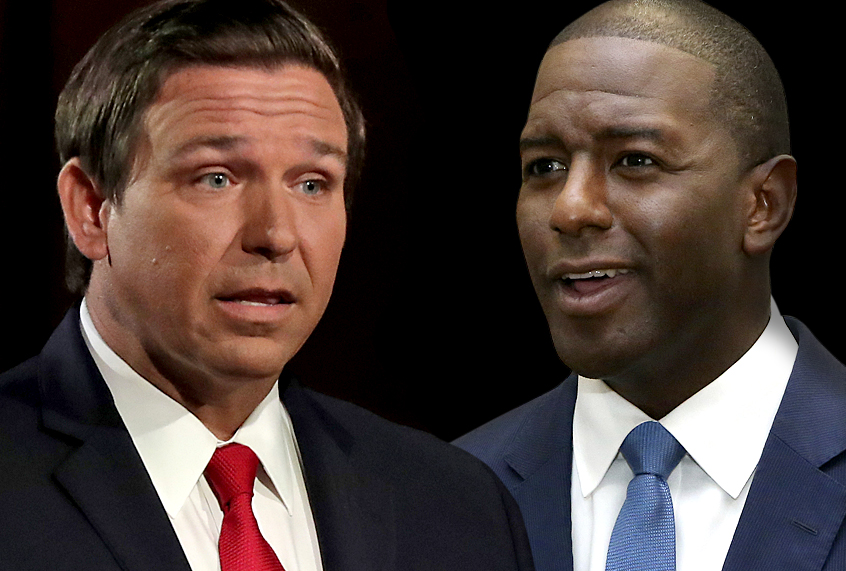On Wednesday, Florida Republican gubernatorial nominee Ron DeSantis, who is white, said during an appearance on Fox News “America’s Newsroom” that his state could “monkey this up” by electing his Democratic opponent, Andrew Gillum, a black progressive who won a surprise primary victory over a “moderate” white Democrat. A Time report provides the full context, beginning with DeSantis’ claim that Gillum, the mayor of Tallahassee, is “charismatic” but “too far to the left”:
Gillum ran on several progressive policies, including gun reform, LGBTQ rights and universal healthcare.
“The last thing we need to do is to monkey this up by trying to embrace a socialist agenda with huge tax increases and bankrupting the state,” DeSantis said. “That’s not going to work, that’s not going to be good for Florida.” he added.
DeSantis’ use of the phrase “monkey this up” has been widely criticized as racist. Even Fox News, where white supremacist talking points are featured on an almost daily basis, backed away from DeSantis’ apparent slur against Gillum. The close scrutiny this comment has received is especially striking given how much the Republican Party has embraced both overt and implicit racism under Donald Trump’s presidency.
But let’s assume for the moment that DeSantis, a congressman who represents a predominantly white suburban district on Florida’s east coast, south of Jacksonville, is innocent of any racist intent. He simply went on the offensive against Gillum in the spirit of partisan combat. In fact, let’s also assume the most generous and sympathetic reading of these events as viewed from a right-wing perspective: that DeSantis, not Gillum, is a victim of sorts who has been caught up in a net of hyper-vigilance targeting racial invective and white racism. He is collateral damage of “political correctness” and fell prey to “reverse racism.” Let us also ignore DeSantis’ apparent leadership role in a Tea Party-style conservative organization with overtones of racism. In fact, none of that is relevant.
DeSantis’ “monkey” comment springs forth from a deep well of global racism and white supremacy under which black people have been stereotyped as monkeys and apes in order to legitimize slavery, colonialism, imperialism and violence. That legacy of continues in the present, having morphed and evolved over the centuries to fit new social and political norms in America and around the world. Individual intent and agency are of little importance here because institutional racism works through individuals, regardless of the latter’s intent. In America, racism and white supremacy are everyday affairs. To associate Andrew Gillum (or any other black person) with apes and monkeys is a form of violence against black people as a group, intentional or otherwise.
Social psychologists and other researchers have shown that white Americans subconsciously connect black people to apes, monkeys, and gorillas. Those white Americans who possess such subconscious attitudes (a manifestation of what is known as “implicit bias”) are also more likely than others to advocate for the death penalty for black defendants.
The dehumanization of black people as animal-like, bestial and therefore less deserving of equal rights, freedom and full citizenship encourages and makes legitimate police brutality and other forms of state-sponsored violence. This is one reason why unarmed black people are three times more likely to be killed by white police officers than are unarmed white people. It has been repeatedly shown that America’s police are also more likely to escalate their use of violence against black people as compared to whites in the same scenarios.
READ MORE: In the wake of Mollie Tibbetts’ death, don’t blame immigrants for murder. Blame men
If black people are seen as more like apes than human beings then it is no coincidence that police officers who have used lethal force against unarmed black citizens often deploy a type of racist logic in which the black victims were perceived as “giants” or understood to possess superhuman strength or to be impervious to bullets.
A cultural logic that dehumanizes nonwhites, especially black people, also helps to explain a panoply of negative outcomes along the color line in American society. This includes seemingly unrelated phenomena such as health disparities and environmental racism. Mass incarceration is also an outgrowth of the way the white racial frame tends to dehumanize black people.
This process of dehumanization helps to explain the horrific tragedy in Puerto Rico where it is estimated that 5,000 people — most of them black or brown –died because of the feeble response to Hurricane Maria by Donald Trump and his administration.
These controversies and resulting national conversations about what constitutes racial invective and racism — and in the case of Ron DeSantis, what was in the heart and mind of one white man — can sometimes be useful and necessary. But arbitrating the conscious racial attitudes of one individual is a distraction from more important issues, such as institutional and systemic racism, or the ways white supremacy quite literally kills black and brown people.

